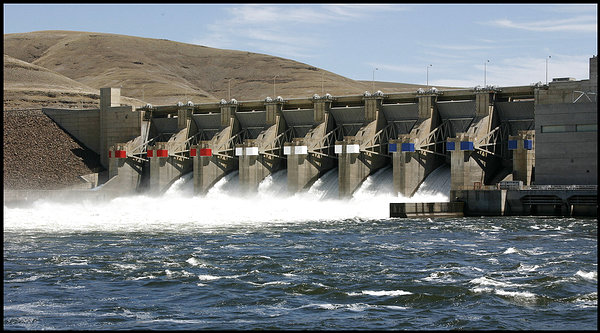forum
library
tutorial
contact

State Department Seeks CRT
Negotiations, But No Timeline
by Ben Tansey
NW Fishletter, July 6, 2015
|
the film forum library tutorial contact |

|
State Department Seeks CRT
by Ben Tansey
|
 In preparing to approach Canada about the future of the Columbia River Treaty, the United States has decided to "press for modification of the treaty that takes into account flood risk management, ecosystem-based function and hydropower generation," a State Department spokesperson told NW Fishletter June 18. "We hope to approach Canada soon with our negotiating position but do not have a timeline," the spokesperson added.
In preparing to approach Canada about the future of the Columbia River Treaty, the United States has decided to "press for modification of the treaty that takes into account flood risk management, ecosystem-based function and hydropower generation," a State Department spokesperson told NW Fishletter June 18. "We hope to approach Canada soon with our negotiating position but do not have a timeline," the spokesperson added.
This comment came several weeks after State sent a May 20 letter to the Northwest congressional delegation, which also said the department has "decided to include flood risk mitigation, ecosystem-based function, and hydropower generation interests in the draft U.S. negotiating position." In addition, the letter assured regional Congress members that "the future of the Treaty is a priority, and internal deliberations are gaining momentum." The letter was signed by Julia Frifield, State assistant secretary of legislative affairs.
Some regional interests said the sentiment in the spokesperson's comment and in the letter is consistent with the Northwest Regional Recommendation from December 2013, and that while both are non-specific, their import is that it is the first time the administration has put this sentiment in writing.
"It was a good start, and I think it was good that they acknowledged and seemed to accept the general premise of the regional recommendations," said Tom Karier, Washington member of the Northwest Power and Conservation Council and member of the Sovereign Review Team that participated in crafting the Regional Recommendation. "It's confirmation that they are on the right track and marks a critical step in the beginning of a longer effort to improve the treaty."
Frifield's letter came in response to one sent in April to President Obama by the Northwest congressional delegation, seeking some indication from the administration on its thinking. It's been 18 months since the U.S. Entity--composed of BPA and the regional office of the U.S. Army Corps of Engineers--delivered the Regional Recommendation on the treaty's future. Frifield said the recommendation was "an extremely useful document."
State told the U.S. Entity that, acting on behalf of the National Security Council and the president, it would undertake a review of the treaty. But it has all but gone dark since then, with no timeline or process details. As the time since filing of the Regional Recommendation has lengthened, interested parties in the region have grown more anxious.
Neither BPA nor the Corps had seen a copy of the letter, nor had any comment on it.
The State Department spokesperson said the government has been deliberating internally about the treaty and that government agencies also continue to meet with tribes and stakeholders "to hear their interests and concerns."
BPA and the Corps held their regular semi-annual meeting with the 15 Columbia River Basin tribes on June 19 at the Portland office of the Columbia River Inter-Tribal Fish Commission. Tribal representatives were recently in Washington, D.C., to speak to the administration and delegation about moving forward with the treaty.
Rich Janssen, the Sovereign Review Team tribal staff designee of the Confederated Salish and Kootenai Tribes of the Flathead Reservation, said the letter from State "sounded like a good incremental step." He noted that Canadian non-government organizations serving on a roundtable in Canada on the treaty have, along with First Nations groups, been pushing Canada to move ahead with the treaty with respect to fish passage, ecosystem function and fish reintroduction.
Janssen also noted that the Canadian Supreme Court's June 2014 Chilcotin decision granting aboriginal title to a large tract of land in British Columbia--a 9-0 decision described by Canadian tribes as a game-changer--has upped First Nations' status. Before, First Nations had to ask to be involved in government matters and wait a month for a response, he said.
But now, government agencies are required to consult with the tribes on major issues. Some U.S. senators have complained that the Northwest is at a disadvantage because the U.S government is required to consult with tribes as part of its treaty obligations.
Ben Tansey
State Department Seeks CRT Negotiations, But No Timeline
NW Fishletter, July 6, 2015
learn more on topics covered in the film
see the video
read the script
learn the songs
discussion forum
